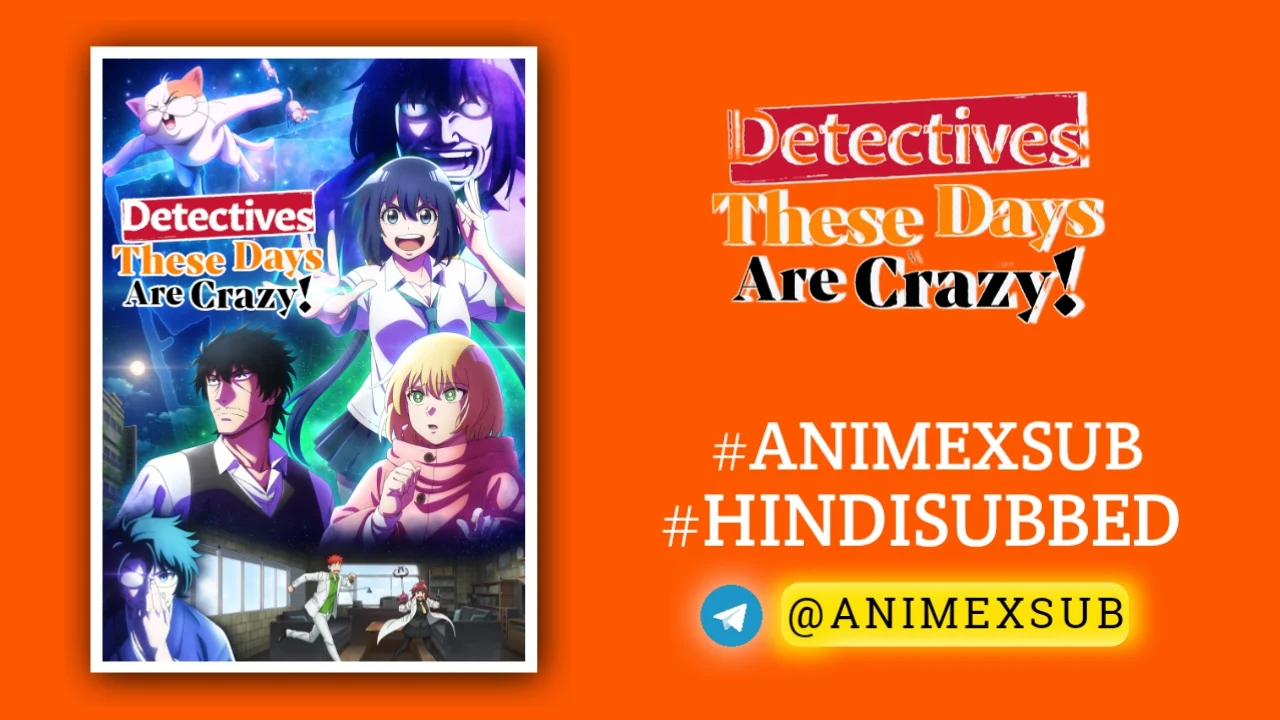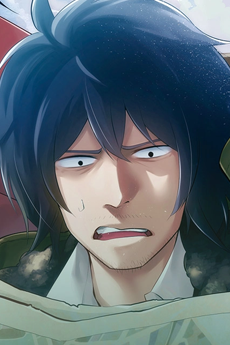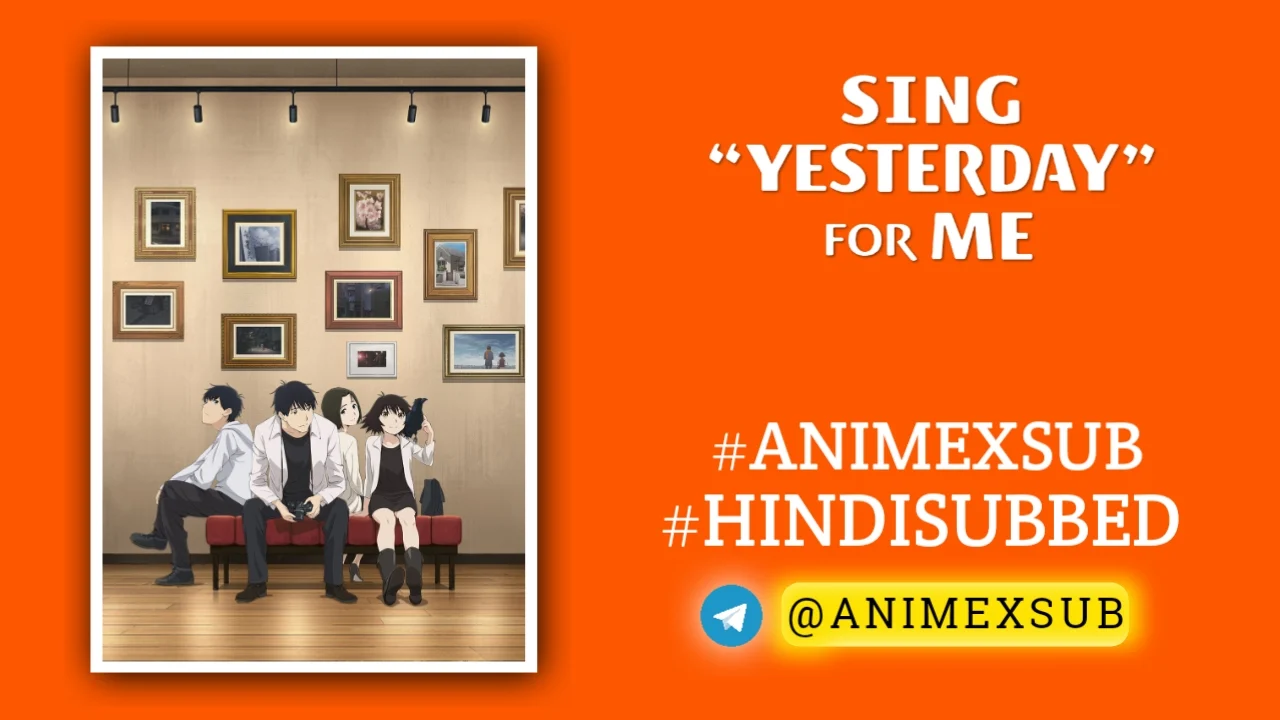
Detectives These Days Are Crazy! Hindi Subbed [09/12] | Mattaku Saikin no Tantei to Kitara Hindi Sub

Mattaku Saikin no Tantei to Kitara
Detectives These Days Are Crazy!Synopsis
Nagumo Keiichirou was a genius high-school detective. No case was complex enough for him. But what happens to genius detectives when they get older? Now 35, with bad hips, running a failing detective agency with no cases to solve and struggling to pay the rent, he's at a dead end. In comes a high school girl in his office who says she wants to work with him. With her help, will the out-of-touch, old-fashioned Nagumo get back the fire of his youth?
Watch Trailer
Characters
Shadows of Glory: The Washed-Up Wizard of Deduction Meets His Chaotic Catalyst
In the neon-drenched underbelly of modern Tokyo, where smartphones whisper secrets faster than any informant ever could, Keiichiro Nagumo once reigned as the undisputed prodigy of puzzles. Twenty years ago, as a high school savant, he unraveled enigmas that left veteran cops scratching their heads—cases involving shadowy syndicates, impossible alibis, and motives twisted like pretzels. But time, that cruelest of culprits, has a way of cracking even the sharpest minds. Now 35, Nagumo shuffles through his dingy detective agency like a ghost in his own life, his back screaming protests with every creak of the floorboards, his pockets emptier than a solved mystery’s plot holes. The world has moved on to apps and algorithms, leaving him clutching faded case files and a rotary phone that might as well be a relic from the Edo period. Enter Mashiro Nakanishi, a whirlwind of teenage tenacity who crashes into his existence like a plot twist no one saw coming. This high school firecracker, with her unyielding optimism and a skirt shorter than her patience, demands apprenticeship not out of reverence, but raw, unfiltered ambition. What unfolds in Detectives These Days Are Crazy! Season 1 is no ordinary procedural—it’s a riotous collision of eras, egos, and explosives, where deduction dances with destruction in a symphony of slapstick genius.
Fractured Facades: Dissecting the Duo That Defies Detective Dogma
At its core, this anime adaptation of Masakuni Igarashi’s 2016 manga (serialized in Dengeki Maoh and spanning 15 volumes by mid-2024) subverts the sacred tropes of the genre with surgical precision. Nagumo, voiced with world-weary gravitas by Jun’ichi Suwabe, embodies the archetype of the jaded gumshoe—think a Japanese Columbo crossed with a burned-out Philip Marlowe, but armed with hip braces instead of a flask. His glory days as a teen sleuth inspired a legion of wannabes, yet he’s now baffled by basic tech: smartphones are “alien artifacts,” and social media might as well be sorcery. This isn’t just lazy writing; it’s a razor-sharp satire on obsolescence in an industry overrun by viral videos and AI-assisted forensics. Mashiro, brought to vibrant, chaotic life by Kana Hanazawa (whose performance channels the unhinged energy of her Psycho-Pass roles but amps it to eleven), is the perfect foil. Bubbly yet brutal, she idolizes Nagumo’s legend while bulldozing his complacency. Her “brute force” approach—procuring flamethrowers, self-inflating mats, or even a daruma doll from the infinite abyss of her school uniform—turns every investigation into a farce of physics-defying absurdity. Their dynamic isn’t mentor-protégé; it’s a generational grenade lobbed into the heart of tradition, exploding clichés into confetti. Supporting cast like the lockpicking rival Yuu Asunaro (Tomohiro Yamaguchi), his no-nonsense assistant Hana Kazamaki (Aya Hirano), ex-yakuza errand boy Taro Nezu (Kengo Kawanishi), and gadgeteer Azuha Hoshino (Ai Fairouz) flesh out the agency into a dysfunctional family of freaks, each adding layers of rivalry and reluctant camaraderie that elevate the ensemble beyond mere sidekicks.
Case Files of Carnage and Comedy: Episode Breakdowns That Bleed Innovation
Season 1, a 12-episode romp produced by Liden Films under director Rion Kujo (with scripts by Rintarō Ikeda and character designs by Isoroku Koga), premiered on July 1, 2025, via AT-X and streams on Crunchyroll. Each installment splits into self-contained vignettes, blending episodic cases with overarching agency growth, but infused with next-level narrative flair that feels like a love letter to detective lore rewritten by a madcap auteur. Episode 1, “Former Great Detective, Keiichiro Nagumo” and “Mashiro’s Pest Extermination,” kicks off with seismic energy: Mashiro’s explosive entrance (literally, involving a window-shattering dive) forces Nagumo into a stakeout gone hilariously awry, culminating in a yakuza torching that recruits Taro on the spot. The humor peaks in visual gags—like Nagumo’s exaggerated back spasms mirroring real midlife maladies—while subtly nodding to classics like Gintama in its meta-parody of genre staleness. By Episode 2, “Ghost Hunt and Underwear Heist,” the agency tackles spectral school shenanigans and a panty pilfering plot that accuses Nagumo himself, weaving innocence-lost themes with over-the-top chases involving bee swarms and improvised flamethrowers. Mid-season gems like Episode 4’s haunted mansion dinner party (echoing And Then There Were None but with slapstick mass-murder flashbacks) and Episode 6’s bar crawl initiation for Mashiro explore “grown-up society” through pranks that blur lines between vice and virtue. Later arcs, such as Episode 8’s partner-swapping sleepover with Azuha and Maki, delve into jealousy-fueled rivalries, while the finale teases deeper lore on Nagumo’s past inspirations. What sets this apart? The cases aren’t just solved—they’re deconstructed. Puzzles incorporate modern twists like viral ghost videos or app-tracked alibis, but resolutions hinge on absurd, character-driven chaos, making each episode a standalone masterpiece of mishap.
Sonic Assaults and Visual Vortexes: Production Polish That Punches Above Its Weight
Liden Films delivers animation that’s a feast for the senses, blending fluid slapstick with meticulous detail in a way that rivals Studio Trigger’s wildest whims. Isoroku Koga’s designs pop with exaggerated expressiveness—Nagumo’s perpetual scowl morphs into meme-worthy distortions during pain spikes, while Mashiro’s eyes sparkle like fireworks before she unleashes hell. Backgrounds evoke a gritty, lived-in Tokyo, from fog-shrouded alleys to cluttered agency offices stacked with analog relics amid glowing screens. The soundtrack, composed by Tomoki Kikuya, pulses with jazzy noir undertones that shatter into punk-rock frenzy during action beats, perfectly underscoring the tonal whiplash. The OP, “Suffer” by Taiiku Okazaki, is a gritty anthem of endurance, visualizing Nagumo’s daily torments in a montage of comically catastrophic fails. But the ED steals the show: “GORI☆GORI Feez e-Girl!!” performed by Hanazawa as Mashiro and Tomokazu Sugita as the “Jolly Old Men” chorus, a bubbly electro-pop riot that mashes idol energy with detective puns, complete with chibi antics that loop back to episode highlights. Voice acting elevates everything—Suwabe’s gravelly resignation contrasts Hanazawa’s hyper pitch-perfect chaos, creating chemistry that’s electric and endearing. No filler here; every frame, sound, and syllable is engineered for maximum impact, turning what could be a B-tier gag fest into a production pinnacle.
Echoes in the Ether: Fan and Critic Verdicts on a Genre Game-Changer
Reception for Season 1 has been a polarized powerhouse, clocking an IMDb 5.9/10 from 177 ratings early on, but surging in anime circles for its unapologetic audacity. Reddit’s r/anime discussion thread for Episode 1 racked up 586 votes and 239 comments, with users hailing it as “the quality meme anime we hoped for after My Deer Friend Nokotan” and praising Hanazawa’s “chaotic energy” in lines like, “When he threw her out the window and the cops got called… I died laughing.” Comparisons to Vampire Dies in No Time and Gintama abound, with fans appreciating the “love-hate letter to detective tropes” blended with Dumb and Dumber-esque absurdity. CBR’s review lauds its “unapologetic gag anime” status, noting how it rips off classics “in the best ways” by acknowledging the genre’s archaic vibes, though critiquing the fast pacing for cramming in too many characters too soon. Anime Corner calls the premiere “fiery” and “worthwhile for comedic fans,” highlighting the duo’s personalities as a standout. However, not all are sold: Anime Feminist slams the sexist undertones in Mashiro’s “manic pixie” role and ageist jabs at Nagumo’s 35-year-old “decrepitude,” calling it “lazy writing” that ogles a teen through an adult lens. The Review Geek echoes this mixed bag, dubbing the opener “rocky and clichéd” in its perv comedy but praising the shift to “cleverly worked humor” with bee-nest bee-lining cases. Overall, it’s a sleeper hit for gag enthusiasts, scoring high on rewatchability for its brain-rot balance—think 8/10 for pure fun, but docking points for fanservice that sometimes overshadows the satire. As one Reddit user quipped, “Detectives really are crazy these days… and this show’s proof.”
Eternal Enigmas: Why This Season Redefines the Deductive Delirium
Detectives These Days Are Crazy! Season 1 isn’t just an anime; it’s a seismic shift in how we view the detective saga, fusing generational gaps with grenade-level gags to birth something profoundly original. In a sea of somber sleuths and high-stakes thrillers, it dares to ask: What if Sherlock Holmes hit midlife crisis and teamed up with a Doraemon-wielding delinquent? The result is pure, unadulterated innovation—cases that critique modernity while celebrating chaos, characters who evolve through explosive mishaps, and a purity of comedic craft that’s never been bottled before. Forget procedural perfection; this is next-level narrative anarchy, where every unsolved ache in Nagumo’s back mirrors the unresolved tensions of a world too fast for its legends. As the agency expands and mysteries multiply, Season 1 leaves you craving more, proving that sometimes, the craziest detectives solve the deepest riddles: the ones about rediscovering your spark in a world that’s left you behind. In the annals of anime, this stands as an epic testament to reinvention, a flawless fusion of farce and foresight that demands your deduction: watch it, or miss the plot twist of the summer.1











